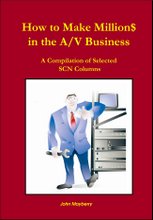Shure Says White Space Devices 'Not Ready For Prime Time'
NILES, IL--Shure Incorporated applauded the release of test results that evaluated the performance of proposed unlicensed devices that would operate in the "White Spaces" of the TV broadcast spectrum. The FCC's Office of Engineering and Technology released the results of the testing yesterday."Shure has always urged policymakers to leave this issue in the hands of unbiased and independent testing experts. Unfounded promises that interference mitigation technology 'will work' aren't good enough. After the release of this report, the Commission and Congress can see why the independent analysis was so important," said Sandy LaMantia, president and CEO of Shure.
FCC experts tested two prototypes of proposed personal/portable consumer devices that were designed to detect and avoid both active DTV channels and wireless microphone signals. According to the test report, however, the prototype devices failed to consistently sense or detect the presence of either DTV broadcasts or wireless microphones. Testing also showed that the prototype devices interfered with digital cable TV channel reception on three DTV receivers in a typical home environment."The idea that big manufacturers can dump millions of new gadgets onto the same frequencies as wireless microphones without causing devastating interference to sports, entertainment, religious, news gathering, and other live productions is simply not supported by engineering reality," said Mark Brunner, senior director of public and industry relations at Shure.
"The FCC's Office of Engineering and Technology deserves tremendous credit for resisting pressure to forego a hard look at claims that the new devices won't interfere and for resolving the issue on sound and objective engineering analysis."The tests were conducted as the FCC prepares to issue regulations in October that will govern whether unlicensed consumer devices are permitted to operate in the so-called "White Spaces" between active TV channels. This spectrum has been used by wireless microphones and other wireless audio devices for more than 20 years.
About This Blog:
Integrating complex electronic projects requires industry individuals keep abreast of the latest technological trends.
Some things are important, many ironic, others outright frauds, and a few are just so very wrong. Occasionally the original technological goal and downstream results are in hilarious conflict.
Usually "the latest trends" go back fifty to one hundred years in their development and are only new to the uninformed. In most every case, the ancients have truly stolen our inventions!
As far as we know, this is the only place that collects them and lets you celebrate them for yourself. We'd love to hear from you if you have something we've missed!
Some things are important, many ironic, others outright frauds, and a few are just so very wrong. Occasionally the original technological goal and downstream results are in hilarious conflict.
Usually "the latest trends" go back fifty to one hundred years in their development and are only new to the uninformed. In most every case, the ancients have truly stolen our inventions!
As far as we know, this is the only place that collects them and lets you celebrate them for yourself. We'd love to hear from you if you have something we've missed!
Blog Archive
-
▼
2007
(294)
-
▼
August
(61)
- NBC Pulling Shows From iTunes
- RIP: Sony's Proprietary Audio Format
- Something AT&T Forgot in their Ads...
- Stanford's Content Pirating Policy
- Earthlink WiFi Initiative Tanking
- No More Time of Day for California
- Perfect Pitch
- Metro Group Goes RFID Worldwide
- $300 per Seat for Thin Client- Cut PC Expense
- CD 25 Years Old Friday
- More iPhone Developments
- American Owned, Chinese Made Flat Panel Manufactur...
- Music Piracy Loses Mount
- Concert Business Threatened Soon?
- Sharp Unveils Ultra Thin, Low Energy TV
- Concerned About Lightning Strikes?
- US Broadband Deployment
- Wireless Mics Versus WiMAX, continued...
- When a System Breaks Down
- Stupid and Stupider
- Thought You'd Like This One
- End of an Era- NSCA Tradeshow Gone
- A Word for Those Contemplating Vista
- Parent of Mackie and EAW Struggling
- Harman Sale in Jeopardy?
- AVI and SPL to Merge?
- Skype Service Outage Caused by Software Problems
- Cable Fights Back - 100 Mbps Soon?
- No More Scaling Down
- Can India and China Really Produce So Many Engineers?
- World's Highest Resolution Video Display
- Those Ads Before the Movie
- Follow the Leader
- Ever Wondered Where iPods & iPhones are Made?
- Whither WiMAX?
- Russell Johnson, 83; innovative acoustician for cl...
- Music Sales Down Again
- Confused About What's Going on in Anaheim?
- Microsoft in the Car
- Reelin' in the years: Cassette tapes still have th...
- Lecson Audio Group Added
- Wireless Mic Saga, continued...
- First Underwater Video Camera
- Requiem for Bat Boy
- Your Tax Dollars At Work
- More on Exotic Cabling
- Interested in Digital Signage?
- WDW One Day Admission Raised to $71
- Thoughts on Exotic Power Cables
- US Digital Cinema Installations Scoreboard
- Microsoft Rewards Chinese for Stealing
- CCTV System- $480 at Costco
- University of California to distribute $7.2 Billio...
- Ad Firm Rents 20,000 Bikes in Paris
- Disney Theme Park Results
- 12 Ounce HD Camcorder?
- Electrovoice System Defeats Parking Tickets
- Tequila Willie's in Melbourne Florida Sued by ASCAP
- Private Equity- How It Affects YOU!
- CBS Outdoor Rolls Out the Cube
- Sharp Building LCD Build Complex
-
▼
August
(61)

